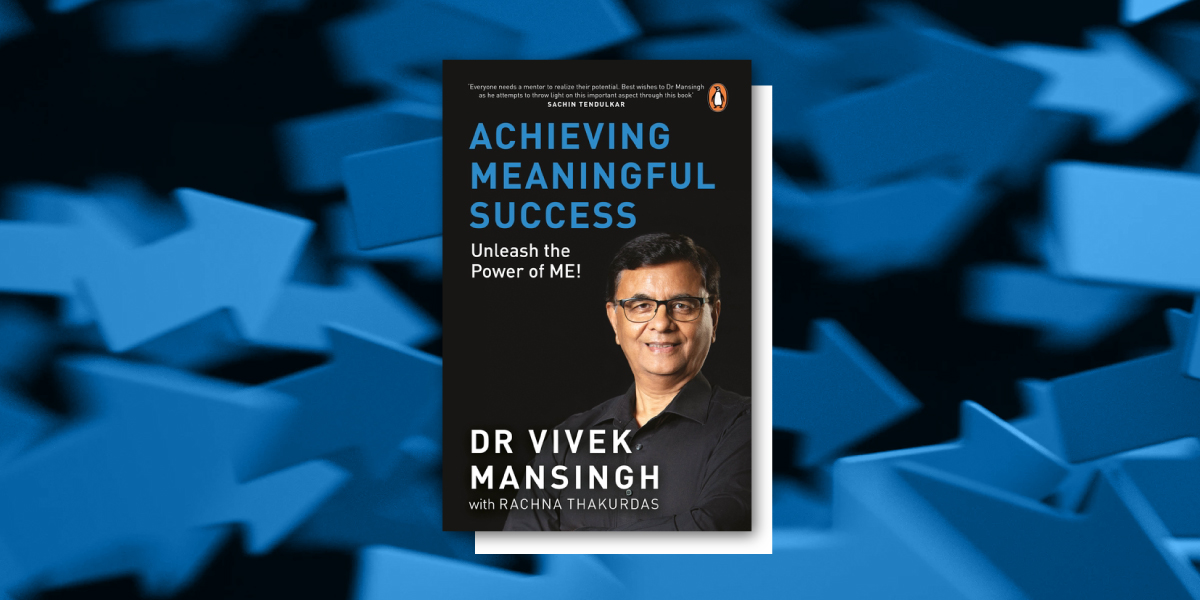
“The greater danger for most of us is not that our aim is too high and we miss it, but that it is too low and we reach it.”
Michelangelo
According to Dr. Vivek Mansingh, one should be aspirational and think big when setting professional goals instead of worrying about the constraints that you might face while achieving them. Freeing yourself from constrained thinking is one of the most important things to achieve meaningful success in the long-run, and consistently. Read an excerpt from Dr. Vivek Mansigh’s latest release to learn more!

It’s not uncommon for people to achieve phenomenal professional success, only to find that they are mysteriously disappointed, and unhappy. This empty feeling has been reported in several studies by seemingly successful people including CEOs, government leaders, scientists, athletes, entertainers and award winners in every walk of life. In a study of CEOs of Fortune 500 companies at Yale University, many apparently highly successful professionals reported that they felt their lives were incomplete and disappointing at many levels.
Professor C. Clayton of Harvard University, author of The Innovator’s Dilemma, talks about an intriguing phenomenon. He did a study of his MBA students at Harvard. At their fifth-year reunion, they were doing fairly well: they had great spouses, jobs, houses and cars. At the tenth reunion, many had achieved professional success, but one-third reported being unhappy in life. At the twenty-fifth reunion, the situation was even more bleak. Although most people were doing well at work and financially, many had been unhappy, divorced or were grappling with relationship issues. Some had serious health issues, and some had even ended up in jail for unethical business practices.
What had gone wrong with these smart people after such a terrific start?
The answer is simple and lies buried in the nature of the goals. Possibly, they pursued single-dimensional success by chasing money or only professional success, and in doing so sacrificed other things that were important for achieving meaningful success.
Andrew Carnegie sums it up neatly: “If you want to be happy, set goals that command your thoughts, liberate your energy, and inspire your hopes.” And he did!
Carnegie, who started his career as a bobbin boy at a cotton factory earning $1.20 a week, went on to sell his company, Carnegie Steel, for some $480 million, making him one of the world’s richest men!
After selling his steel company, this petite-framed colossus, just five feet, three inches tall, retired from business and devoted himself full time to philanthropy.
He gave away some $350 million (the equivalent of billions in today’s dollars): really the bulk of his wealth. Among his philanthropic activities, he funded the establishment of more than 2,500 public libraries around the globe, donated more than 7,600 organs to churches worldwide and endowed organizations dedicated to research in science, education, world peace and other causes. Among his gifts was the $1.1 million for the land and construction costs of Carnegie Hall, the New York City concert venue that opened in 1891. He also funded the Carnegie Institution for Science, Carnegie Mellon University and the Carnegie Foundation. A lover of books, he was the largest individual investor in public libraries in American history.
I often say that if you do not make decisions about your life, someone else will. People without goals end up working for people with goals! So, it is important that you are goal driven and set your own goals.
Once you’ve set your goals, create a strategy and plan and write it down along with milestones. According to many studies, people with written goals have an 80% higher probability of achieving them. I am one of these people.
To me, success wasn’t something I would gauge by comparing against others. I strived to compete with myself after defining what meaningful success meant to me. If success to you means becoming a cricketer, singer or painter, go for it. But strive to be the best that your potential holds. It is also important to be joyful and positive while you are pursuing your goals and going through your life’s journey. According to research in positive psychology, happy, positive and joyful people have higher probability of achieving their goals and success.
If you’re looking to achieve meaningful success and set multidimensional and balanced life goals to help you attain happiness and fulfilment, grab your copy of Achieving Meaningful Success here!









